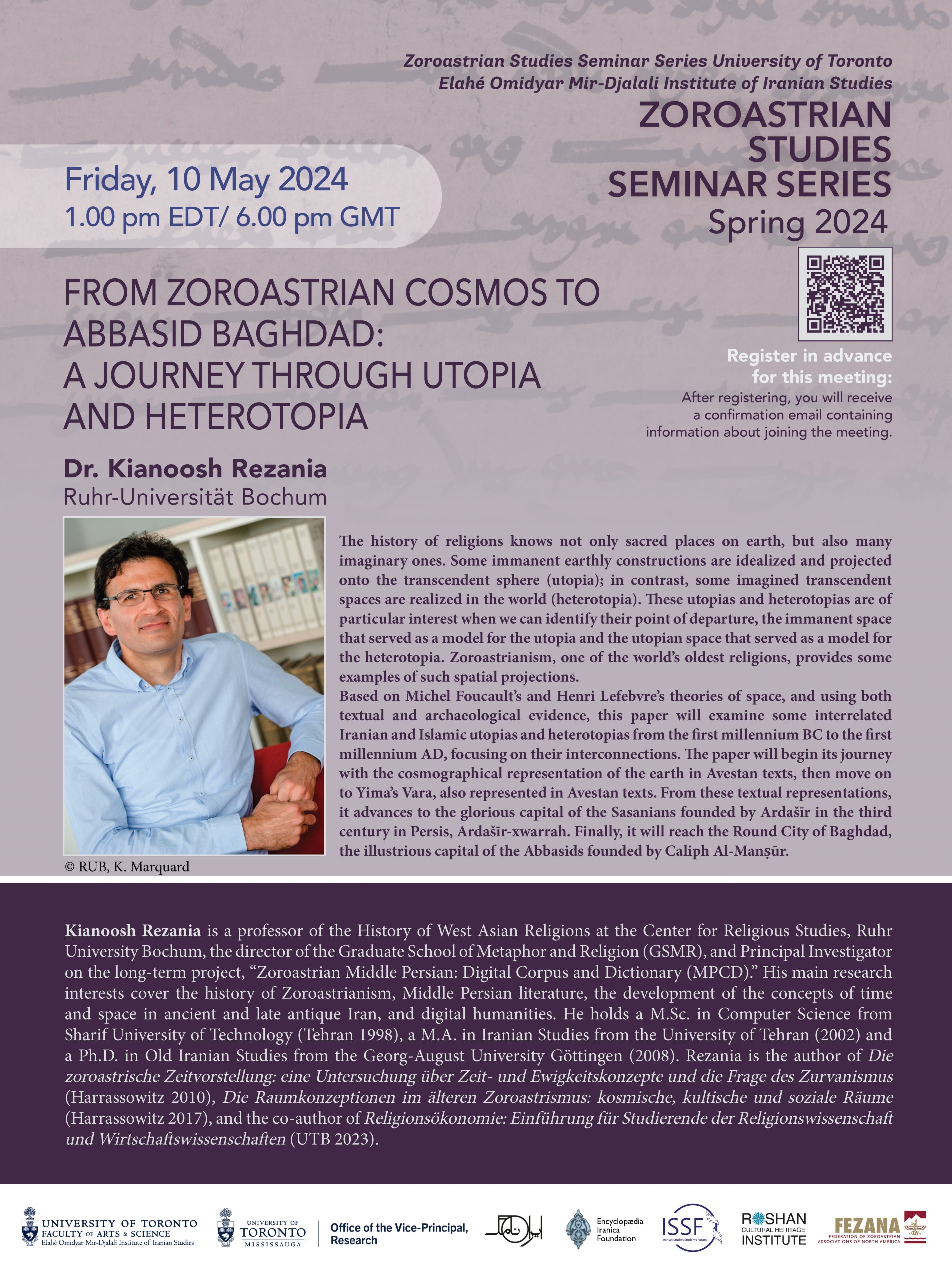

The Elahé Omidyar Mir-Djalali Institute of Iranian StudiesUniversity of Toronto Zoroastrian Studies Seminarpresents
From Zoroastrian Cosmos to Abbasid Baghdad: A Journey through Utopia and Heterotopia
Kianoosh Rezania, Professor, Ruhr-Universität Bochum
Friday, 10 May 2024, 1:00 p.m. EDT/ 6:00 p.m. GMT Zoom Meeting Registration:https://utoronto.zoom.us/meeting/register/tZYod-CsqzkuG9K6V4Y8PHjQkGgkvhNsGb3c
After registering, you will receive a confirmation email containing information about joining the meeting.
Abstract:
The history of religions knows not only sacred places on earth, but also many imaginary ones. Some immanent earthly constructions are idealized and projected onto the transcendent sphere (utopia); in contrast, some imagined transcendent spaces are realized in the world (heterotopia). These utopias and heterotopias are of particular interest when we can identify their point of departure, the immanent space that served as a model for the utopia and the utopian space that served as a model for the heterotopia. Zoroastrianism, one of the world’s oldest religions, provides some examples of such spatial projections.
Based on Michel Foucault’s and Henri Lefebvre’s theories of space, and using both textual and archaeological evidence, this paper will examine some interrelated Iranian and Islamic utopias and heterotopias from the first millennium BC to the first millennium AD, focusing on their interconnections. The paper will begin its journey with the cosmographical representation of the earth in Avestan texts, then move on to Yima’s Vara, also represented in Avestan texts. From these textual representations, it advances to the glorious capital of the Sasanians founded by Ardašīr in the third century in Persis, Ardašīr-xwarrah. Finally, it will reach the Round City of Baghdad, the illustrious capital of the Abbasids founded by Caliph Al-Manṣūr.
Bio:
Kianoosh Rezania is a professor of the History of West Asian Religions at the Center for Religious Studies, Ruhr University Bochum, the director of the Graduate School of Metaphor and Religion (GSMR), and Principal Investigator on the long-term project, “Zoroastrian Middle Persian: Digital Corpus and Dictionary (MPCD).” His main research interests cover the history of Zoroastrianism, Middle Persian literature, the development of the concepts of time and space in ancient and late antique Iran, and digital humanities. He holds a M.Sc. in Computer Science from Sharif University of Technology (Tehran 1998), a M.A. in Iranian Studies from the University of Tehran (2002) and a Ph.D. in Old Iranian Studies from the Georg-August University Göttingen (2008). Rezania is the author of Die zoroastrische Zeitvorstellung: eine Untersuchung über Zeit- und Ewigkeitskonzepte und die Frage des Zurvanismus (Harrassowitz 2010), Die Raumkonzeptionen im älteren Zoroastrismus: kosmische, kultische und soziale Räume (Harrassowitz 2017), and the co-author of Religionsökonomie: Einführung für Studierende der Religionswissenschaft und Wirtschaftswissenschaften (UTB 2023).